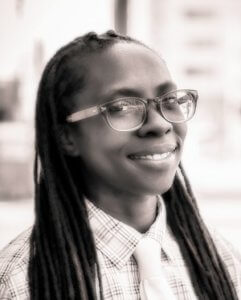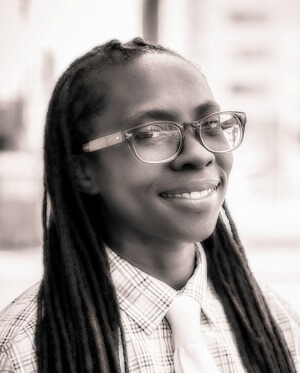An Interview with Camille Cyprian, Director of Program Strategy and DEI, Minnesota Council on Foundations
With a passion for diversity, equity, inclusion and healing, Camille Cyprian’s journey to self-care and community building undergird her professional and personal pursuits.
This interview is the twenty-sixth in our series, Black & Bold: Perspectives on Leadership.
Camille Cyprian, Director of Program Strategy and Diversity, Equity, and Inclusion, Minnesota Council on Foundations
Healer. Thinker. Do-er.
Twitter and Instagram: @CenteredSpaces
What are some of your career highlights?
When I received the questions and was thinking them through, I dreaded this one the most. (Laughter.) I think of highlights as moments of  transition during my professional journey more than accomplishments. It could be the space I am in now. (Camille Cyprian pictured at right.)
transition during my professional journey more than accomplishments. It could be the space I am in now. (Camille Cyprian pictured at right.)
In reflecting, one thread that is consistent and transformational has been my ability to travel. My first full-time post-collegiate job was as a trainer. I traveled across the country and experienced different cultures and geographies. Those experiences have brought me to the Pine Ridge Reservation in South Dakota, road trips across Mississippi to tour HBCUs, to Tampa to lead Get Out The Vote campaigns, to work in Washington, DC, doing youth engagement with young adults ages 18-35 across the nation, and expanding access to the green movement in Oakland. The opportunity to travel has been a point of transformation and a highlight.
Another highlight is the OM Community Coaching Training and Certification Program in Healing Justice. This program launched me on this journey of connecting diversity, equity, and inclusion (DEI) and healing. I was doing work around burnout, self-care, and toxic stress for a while, but this program really launched me on my own journey of self-care and healing. The moment has definitely been life-changing and helped me align my purpose and my work.
The other experience that comes to mind is The Funders’ Network for Smart Growth and Livable Communities PLACES Fellowship. It was a professional learning experience about communities, equity, and smart growth. I had the opportunity to travel and experience various geographies and cultures. Emerging leaders in philanthropy traveled to four sites across the country and really learned from communities about how they were addressing issues of social equity — primarily racial equity — in successful ways and other ways not quite as successful. The transformative thread was travel, but also tying in the work of DEI and really pushing me as a practitioner in that work. It opened up my ideas and thoughts about what it means to be a DEI practitioner and how equity happens. Those are the three moments that have been highlights, or extremely transformational, for me.
If there was a headline for your leadership journey throughout your career, what would it be?
My headline or maybe more my professional mantra would be: “my labor is my love and my love is my protest.” I use that to make sure I am aligned, that my work and my labor align with what I am passionate about. Work is an action of love. That’s how I want to think about where I put my energy, you know?
What are your favorite types of challenges?
I’m tempted to say big social ones that can’t be solved alone. I really enjoy collaboration and the different experiences people bring in the sector. But if I had to say a favorite type of challenge, I would say internal ones that require real intention and mindfulness. Those are the ones that help me grow and make me better both personally and professionally.
What is one book that was meaningful or influential in your development as a leader?
I have many books; some are the same as other leaders like The 48 Laws of Power by Robert Greene and The Seven Spiritual Laws of Success by Deepak Chopra.
One that I have read and return to often is The Body Keeps the Score: Brain, Mind, and Body in the Healing of Trauma by Bessel van der Kolk, which is about how unhealed toxic stress and trauma manifest physically in the body. It was impactful when I initially read it, and I return to it to remind myself how important healing, self-care, and compassion are. It has been influential.
I’m currently reading Daring Greatly by Brené Brown. It’s about embracing vulnerability, which I have grown to learn, and am still learning, that is essential to my practice and the work I lead.
Work in the social sector can be very personal and linked to one’s values. Can you think of a time when your values were in tension during your career and how you reconciled that tension or not?
A very specific time comes to mind. I experienced the organization that employed me as having the ability to address its cultural competency, but there was an unwillingness to do that work. Cultural competency means both internally with employees and in the work with community. There were very clear divisions internally with the culture in regards to that. These divisions rubbed up against my understanding of how we worked with and in community. I ended up leaving the organization. I’m not sure if that’s the reconciliation, but having that experience was important for me to really identify the work that I wanted to do formally and informally — in title and day-to-day as an individual contributor and leader.
Now as I’ve grown, I think being in the social sector there is always passion and some financial concerns. I needed to pay bills early on in my career. Now I have grown to where if I follow the work that I know that I’m supposed to do, then that will afford me abundance and everything that I need. That was a learning experience and maybe another point of transformation in my career.
Summer 2017, Democratic Representative Maxine Waters coined the phrase, “reclaiming my time,” as she thwarted Treasury Secretary Steven Mnuchin’s attempts to waste her time with nonsense. Can you share an experience in the workplace where you have had to reclaim your time? What was the context? How did you navigate it? What was the outcome?
This concept certainly resonates with me. I personally interpret reclaiming my time as reclaiming my energy. When I say I don’t have time, I’m saying I don’t have energy for it. I’m reclaiming my energy every day. Being aware of when your peaks are and when you can really get work done; when your energy is low and it’s okay at those times to do other things. We value productivity with regard to what can be consumed or tangible, but I think there are other products or ways to be productive that might not result in physical or tangible things.
A specific example is when I have worked in a campaign culture. You ate whatever you could, whenever you could. You were on 24/7 which was not sustainable. This launched me on a journey to explore self-care. I had to shift myself, the expectations of the organization I was at, and the expectations of the people I worked with. I set boundaries and maintained them. I had to communicate them. I often observe that people set boundaries but don’t tell others what they are, then they are mad when people cross them. I set them and communicated them. I’m not checking email or available by phone after a certain hour. My auto reply would turn on when my time was up and I used do not disturb for work contacts in my phone. That’s reclaiming my time and energy.
What’s your approach to self-care? Are there any rituals you use to survive and thrive?
I’m so excited for this question. This is my jam. My approach is rooted in the Orange Method of Radical Self-Care. There are four tenets that I use to anchor my practice of self-care:
- Mindfulness and mindful leadership: being present and aware in one’s life and work…really being in the moment.
- Meditation: there are lots of conceptions about meditation. I think of it as quieting the mind and spirt to clear space to set my intentions; really providing myself the space to be intentional in my thoughts, words, and actions.
- Conscious movement: I describe as taking deliberate action to shift mind or body, but to connect that to my work shifting communities and institutions.
- Emotional liberation: this is basically getting unstuck or releasing energy that is trapped — toxic stress, historical trauma, present-day trauma — and being able to move through those emotions and feelings; not with the expectation that those feelings will never return, but with the ability to address them in a healthy way.
There’s also a self-compassion component that I consider related to our internal chatter or self-talk. I consider whether I am being gentle to and with myself and extending myself grace. Self-care can be actionable, but the compassion part can get lost.
I mentioned earlier my evolution in connecting healing work with DEI work. I consider myself a healer in many ways — a healer with individual people and the community — but I also see my work as an equity practitioner as healing work. I view the work of DEI as working to heal systems. It’s been a great personal and professional journey to see how those two things co-exist that don’t necessarily seem to fit together.
What advice would you offer other Black women trying to develop or amplify their voice and become self-advocates?
It would really be around self-care and compassion. You can’t pour from an empty cup. Trauma and toxic stress are real. To go as far as we are capable of, we need to have a self-care and compassion practice that is consistent. Do not let the terminology of self-care make you feel like it has to be done alone. Many self-care practices can be done in community. Compassionate accountability means we are all doing the work of healing as we are out in our daily lives with ourselves, our families, our peers, our coworkers, etc.



Comment section